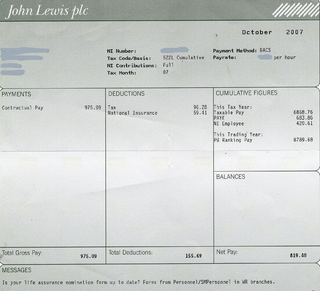Professional certification, trade certification, or professional designation, often called simply certification or qualification, is a designation earned by a person to assure qualification to perform a job or task. Not all certifications that use post-nominal letters are an acknowledgement of educational achievement, or an agency appointed to safeguard the public interest.

National Insurance (NI) is a fundamental component of the welfare state in the United Kingdom. It acts as a form of social security, since payment of NI contributions establishes entitlement to certain state benefits for workers and their families.

A payroll is a list of employees of a company who are entitled to receive compensation as well as other work benefits, as well as the amounts that each should obtain. Along with the amounts that each employee should receive for time worked or tasks performed, payroll can also refer to a company's records of payments that were previously made to employees, including salaries and wages, bonuses, and withheld taxes, or the company's department that deals with compensation. A company may handle all aspects of the payroll process in-house or can outsource aspects to a payroll processing company.

Corporation tax in the United Kingdom is a corporate tax levied in on the profits made by UK-resident companies and on the profits of entities registered overseas with permanent establishments in the UK.

HM Revenue and Customs is a non-ministerial department of the UK Government responsible for the collection of taxes, the payment of some forms of state support, the administration of other regulatory regimes including the national minimum wage and the issuance of national insurance numbers. HMRC was formed by the merger of the Inland Revenue and HM Customs and Excise, which took effect on 18 April 2005. The department's logo is the St Edward's Crown enclosed within a circle.
A professional employer organisation (PEO) is an outsourcing firm that provides services to small and medium-sized businesses (SMBs). Typically, the PEO offering may include human resource consulting, safety and risk mitigation services, payroll processing, employer payroll tax filing, workers' compensation insurance, health benefits, employers' practice and liability insurance (EPLI), retirement vehicles, regulatory compliance assistance, workforce management technology, and training and development. The PEO enters into a contractual co-employment agreement with its clientele. Through co-employment, the PEO becomes the employer of record (EoR) for tax purposes through filing payroll taxes under its own tax identification numbers. As the legal employer, the PEO is responsible for withholding proper taxes, paying unemployment insurance taxes and providing workers’ compensation coverage.
Tax evasion is an illegal attempt to defeat the imposition of taxes by individuals, corporations, trusts, and others. Tax evasion often entails the deliberate misrepresentation of the taxpayer's affairs to the tax authorities to reduce the taxpayer's tax liability, and it includes dishonest tax reporting, declaring less income, profits or gains than the amounts actually earned, overstating deductions, using bribes against authorities in countries with high corruption rates and hiding money in secret locations.
IR35 is the United Kingdom's anti-avoidance tax legislation, the intermediaries legislation contained in Chapter 8 of Income Tax Act 2003. The legislation is designed to tax 'disguised' employment at a rate similar to employment. In this context, "disguised employees" means workers who receive payments from a client via an intermediary, i.e. their own limited company, and whose relationship with their client is such that had they been paid directly they would be employees of the client.

The Gangmasters and Labour Abuse Authority (GLAA) is the foremost intelligence and investigative agency for labour exploitation in the UK. Its role is to work in partnership with police and other law enforcement agencies such as the National Crime Agency to protect vulnerable and exploited workers and disrupt and dismantle serious and organised crime.
An umbrella company is a company that employs agency contractors who work on temporary contract assignments, usually through a recruitment agency in the United Kingdom. Recruitment agencies prefer to issue contracts to a limited company to reduce their own liability. It issues invoices to the recruitment agency and, when payment of the invoice is made, will typically pay the contractor through PAYE with the added benefit of offsetting some of the income through claiming expenses such as travel, meals, and accommodation.

Paul Richard Charles Gray, is a British former civil servant who was chairman of HM Revenue & Customs until he resigned on 20 November 2007.
The National Payroll Institute, formerly the Canadian Payroll Association (CPA), represents Canadian employers' payroll interests.

The American Payroll Association (APA) is a professional association for individuals responsible for processing company payrolls. The Association conducts payroll training courses and seminars on a yearly basis and publishes a library of payroll resource texts and newsletters. The APA has approximately 21,000 members, 121 APA-affiliated local chapters, and registered lobbyists based in Washington, D.C.
The bank payroll tax was a nonrecurring case of specific tax regime that was set to temporarily change the circumstances under which relevant employees of taxable companies obtained their bonuses in United Kingdom. This tax applied to banks which paid bankers bonuses over £25 000 and the tax was charger at the rate of 50%. As stated in Finance Act 2010 schedule 1 part 1 “Bank payroll tax is chargeable on the aggregate of the amounts of chargeable relevant remuneration awarded during the chargeable period or in respect of relevant banking employees of a taxable company by reason of their employment as relevant banking employees.“ It was paid by the bank directly to HM Revenue and Customs (HMRC) and the chargeable period was from 9 December 2009 to 5 April 2010. Bank payroll tax was payable by taxable companies on or before 31 August 2010.

The Association of Taxation Technicians or ATT, is a leading professional body in the UK for those providing tax compliance services and related activities. It is registered with The Charity Commission in the UK (803480).
Liberty Accounts is an integrated online accounting and payroll system designed specifically for small and medium enterprises, not-for-profit organisation and charities in the UK. Also described as a software as a service or SaaS cloud computing application, Liberty is available to business owners, treasurers and accountants.
The Institute of Accountants and Bookkeepers (IAB) was founded in the United Kingdom in 1973 and, as a non-profit organisation, in its early years focussed purely on being an international professional and examining body for bookkeepers. Building on it today, the IAB offers financial and business skills for those starting or developing a small business. It also continues to develop and deliver courses in accounting and bookkeeping at various levels and subjects, claiming many thousands of members and students worldwide. The IAB is present in most parts of the world where UK accounting standards or Generally Accepted Accounting Principles GAAP are used. In 2012, the IAB claimed to have 4,000 students in India currently registered and/or preparing to take an IAB exam. In addition to students studying with colleges throughout the UK, it has students studying with the University of the West Indies, and in Brunei Darussalam, Singapore, Malaysia, Indonesia, Vietnam, Cambodia, Thailand, Russian Federation and other European Countries, Baltic States, Belarus, India and Sri Lanka. The Institute of Certified Bookkeepers in South Africa graduates are recognised by the IAB.
Pension Led Funding (PLF) is a financial services product offered in the United Kingdom (UK) that raises funds for businesses based upon the use of pension benefits accrued by owners or directors of the business they control. The money can then be used for the provision of a secured commercial loan, the purchase of commercial property, *the purchase of intellectual property assets, or the purchase of share capital.
Michael Clasper CBE is the British Chairman of Coats Group plc and the former chairman of Her Majesty's Revenue and Customs (HMRC) (2008-2012).
Norman Pickavance is an advisor, author and activist, addressing issues at the intersection of business and society, leading research, innovation and collaborative action. He has advised business, society and political leaders, plus various CEO's, Chairs and All Party Parliamentary Groups on strategy & policy, trust & governance, skills & employment, pay & fairness, mental health, modern slavery and social mobility matters. Pickavance recently Chaired a Task Force into the Future of the Retail Industry in the UK on behalf of the Fabian Society. His first book, The Reconnected Leader, was published by Kogan Page in December 2014. He is Co-founder of a Social Impact Initiative - The Financial Inclusion Alliance - addressing the challenges facing Britain's Working Poor.







